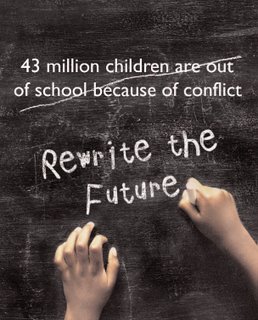- In 2003, more than half of armed conflicts used combatants under the age of 15.
- More than five million primary-aged children (6-11 years) are out of school in the Democratic Republic of Congo (DRC), and more than six million 12-17 year olds have never been to school.
- In Nepal, between January and August 2005, more than 11,800 students were abducted from rural schools for indoctrination or forced recruitment into the militia.
- In Afghanistan, most qualified teachers fled the conflict. Now fewer than 15% of teachers hold professional qualifications.
The new research from Save the Children exposes the devastating consequences of armed conflict on education in thirty countries. Schools are destroyed or commandeered by armed forces, teachers are killed or flee to escape the violence, children can be recruited and forced to fight, and are more vulnerable to abuse and exploitation.
Save the Children has identified a ‘blind-spot’ among international donors who are reluctant to commit funds for education in conflict-affected countries. The report finds that children living in these countries receive the least amount of aid for education because donors find it too difficult to deliver aid to them.
Over 40 countries across the world will today launch ‘Rewrite the Future’, Save the Children’s biggest global campaign in its 85-year history. Among the campaigns international supporters are Archbishop Desmond Tutu and United Nations Under-Secretary-General for Humanitarian Affairs and Emergency Relief Jan Egeland.
International donors see conflict-affected countries, where education is vital in breaking the lethal cycle of poverty, destruction and conflict, as not having adequate systems in place to ensure aid reaches the children who need it. Little has been done to rectify the situation. Instead donors have chosen to ignore the problem, leaving millions of children without an education for years.
School gives children a safe place to be, teaches them skills to protect themselves and can help them recover from trauma. Education is vitally important to children and parents living in conflict who know that it offers a route out of conflict and poverty.
Evidence suggests that primary education significantly contributes to a country's economic development. Of the world’s poorest countries 16 have suffered a major civil war in the past 20 years.
Save the Children is calling for:
- The international community to fill the funding gap by providing an extra US $5.8 billion in aid to fund education in conflict affected fragile states.
- The international community must ensure adequate systems are in place to deliver their aid to conflict affected countries.
- Education to be part of the humanitarian response in every emergency.
- All national governments to ensure government forces and armed militia who are violent towards teachers and students are prosecuted.
Over the next five years, Save the Children will ensure that three million out-of-school children in conflict-affected countries enter school by 2010 and, at the same time, improve the quality of education for five million more.
We will work in 20 countries helping to build schools, training teachers and provide essential materials such as books and pens. Save the Children will persuade national governments and international donors and institutions to significantly increase their funding for education and make education for more than 43 million children affected by armed conflict a priority.
Jan Egeland, United Nations Under-Secretary-General for Humanitarian Affairs and Emergency Relief Co-ordinator, said: “It is a moral outrage how the world is treating these children. The international community cannot leave vulnerable children, already living with the consequences of armed conflict, without the hope of a decent future. Children cannot wait for conflict to end before we give them the opportunity to go to school.”
Download the report - shorter version
Download the report - Longer version
Source: Save the Children


No comments:
Post a Comment